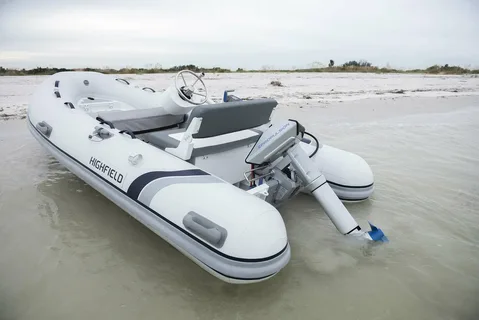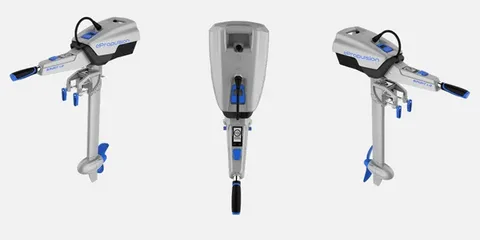Electric Outboard Motor | Everything You Need to Know
More and more people are choosing to buy electric outboard motors instead of gasoline-powered ones, and it’s easy to see why. They provide a cleaner and quieter experience while boating. But do electric motors work with all types of boats? A lot of questions arise regarding the practicality of electric outboard motors such as “Are electric outboards worth it?”, “What is the lifespan of a battery powered electric outboard?”, “Which size electric outboard motor do I need?”, or “Why aren’t electric motors common in boats?”. This guide will cover all these important considerations so that you can choose whether or not electric outboards are suitable for you.
What are the advantages of electric outboards?
Comparing the pros and cons of electric outboard motors will definitely help you make an informed decision. Starting with the Eco friendly advantage, electric motors produce less fuel emissions which helps reduce air and water pollution. Due to low noise levels they are ideal for wildlife watching and fishing. They are relatively inexpensive to maintain due to having no fuel requirement, and lower maintenance requirements. Electric outboards further allow for quick boating acceleration, and due to their compact nature, offer easy transportability.

Downsides of Electric Outboard Motors
Limited Range: Battery life dictates how long you can run before needing to recharge.
High Initial Cost: The price of quality electric outboards and their batteries can be quite high.
Charging time: Recharging any battery takes longer than refueling a gas-powered motor.
Lower Top Speeds: Outboard motors are less powerful than traditional internal combustion motors, and so, do not perform well for high speeds.
For eco-friendly sailors, and for small boats, dinghy, or fishing trips, an electric outboard is unmatched. For long-distance travel or fast-paced boating, however, a gas-powered motor is still the preferable option.
How Long an Electric Outboard Will Run on a Battery?
The duration of run time for an electric outboard is dependent on the controllable parameters of battery capacity, motor power, and the set conditions.
Factors Affecting Battery Life
Battery Capacity (Ah or kWh): Longer run times are achieved with batteries that have higher capacities.
Motor Power (Watts or HP): A motor with more power will drain the battery to a greater extent.
Speed and Load: Running on full speed or carrying a heavy load diminishes battery life.
Water Conditions: More energy is needed in strong currents or rough waters.
Common Electric Outboard Estimated Runtime By Motor Power
Battery (kWh)
Estimated Runtime (Full Power)
| Motor Power | Battery (kWh) | Estimated Runtime (Full Power) |
| 1 kW | 5 kWh | 5 hours |
| 3 kW | 10 kWh | 3 hours |
| 5 kW | 15 kWh | 3 hours |
| 10 kW | 30 kWh | 3 hours |
Electric outboards significantly increase their runtime to 10 hours with decreased speeds, making them a boon for fishing and cruising.
What Size Electric Outboard Motor Do I Need?
Your electric motor selection should take into consideration the weight of your boat as well as how you will be using it and the surrounding conditions. The following chart offers a basic guide for power requirements:
Selecting The Correct Power For Your Boat
| Boat Type | Recommended Electric Motor Power |
| Kayak/Canoe | 300W – 800W |
| Dinghy | 1 kW – 3 kW |
| Fishing Boat | 3 kW – 5 kW |
| Pontoon Boat | 5 kW – 10 kW |
| Small Sailboat | 3 kW – 6 kW |
| Large Boat | 10 kW+ |
Test your speed monitoring for accurate performance measuring at 100W per 100 lbs of boat weight.
.testing my speed monitor for measuring performance at the base of 100W per 100 lbs of the boat’s weight.
Why Don’t Boats Use Electric Motors?
The gas powered motors are still quite popular because:
1. Technology Limitations
Unlike cars, boats don’t have regenerative braking to recharge the battery.
Batteries for long-range travel are still hefty and pricey.
2. Bottomless Power Supply Issues
Electric motors are currently crippling when it comes to efficiency because yachts and speedboats require an enormous amount of power.
The current selection of electric motors is more appropriate for smaller and slower boats.
3. Powering Services
Filling stations for fuel are plentiful, unlike charging stations for boats, which are few and far between.
Recharging stations for longer trips on a boat may be hard to come by.
4. Barrier By Value
An electric motor with a battery costs significantly more than a gas engine, irrespective of the performance level.
The cost of upgrading the entire system is worrying to most boat owners.
5. Ethos and Industry Standards
The boating industry has primarily used combustion engines for many years.
A number of boat users are unwilling to switch to electric motors until they are widely proven.
Prospects of Electric Motors
With progress in the field of batteries as well as environmentally friendly technology, electric outboards are becoming more efficient. Other companies like Torqeedo, ePropulsion, and Mercury are leading innovations in electric marine propulsion.
New Changes on The Way
Batteries with Higher Energy Density – Power sources that are lighter and longer lasting.
New Faster Charging technology – Decrease in downtime when it comes to systems recharging.
Motors That Are More Powerful – Motors that can replace larger combustion powered engines.
Better infrastructure – the increase of marine charging stations.
The growth in environmental concern has meant that electric outboards will play an essential role in the future of boating.
To Conclude
Electric outboard motors are quiet and environmentally friendly which makes them a good selection for those who love boat riding. However, in comparison to gas engines, they do suffer from some restrictions. If you are asking yourself “Is an electric outboard worth it?” then the answer truly is ‘it depends’ on what you are looking for. If you’re into small boats or fishing, and like short trips, then electric motors are an ideal opportunity. Meanwhile, gas engines still take the lead when it comes to long distance or high-speed travel.
Considering these elements alongside runtime such as the industry’s challenges, the ratio of the motor’s size, and the unit’s weight helps determine if the investment on an electric outboard is optimal. With advancements in battery technology, we anticipate seeing electric motors available for all types of boating.




Post Comment